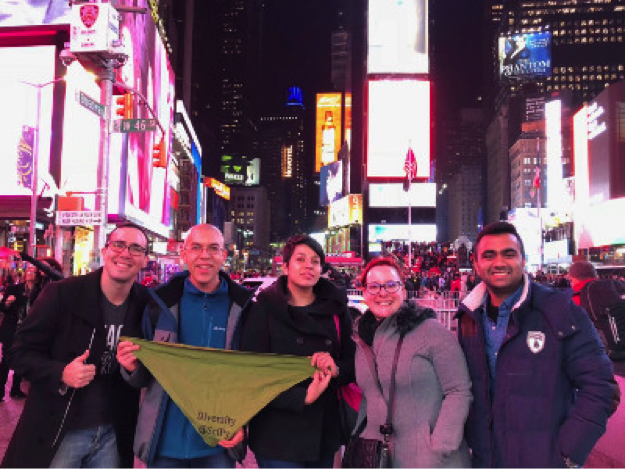Diversity & Inclusion in Scientific Computing Unconference
Posted on 1 February 2018
Diversity & Inclusion in Scientific Computing Unconference
 By Raniere Silva, Software Sustainability Institute.
By Raniere Silva, Software Sustainability Institute.
In early 2017, NumFOCUS received a grant from the Gordon and Betty Moore Foundation that helps fund a variety of diversity and inclusion initiatives, including the Diversity & Inclusion in Scientific Computing Unconference during PyData New York City 2017. NumFOCUS is publishing notes about the Unconference at their blog.
This wasn't my first time attending a event label as a unconference, I attended Google Summer of Code Mentor Summit, Mozilla Festival and, of course, Collaborations Workshop, and because of this I had my own fantasy of how the event would be: diverse and amazing group of attendees, infinite number of breakout rooms—you can fit as many breakout rooms as you want in the corridor—hosting the most interesting discussions in parallel and not enough of your favourite beverage to keep you up throughout the day.
NumFOCUS and Microsoft, who hosted PyData New York City 2017, did a fantastic job ensuring that we stay hydrated—in a unconference you talk more than normal so it’s very important to keep drinking to avoid returning home without a voice. Sadly, we had less discussions than I was expecting but we could collaborate in some projects.
Our activities started on the 29th of November. Gina Helfrich, NumFOCUS Communications Director and Program Manager for Diversity & Inclusion, welcomed all the attendees and set some ground rules for the next two days, mainly some highlights of the Code of Conduct. After the introductions, Gina facilitated a project brainstorming session where we started writing project ideas in post its that later moved to the wall and in a later stage were clusterised—we had to do it manually but maybe in the next event one of the attendees will have a machine learning application ready to do the job for us. I was impressed with the number of interesting projects that attendees want to discuss or work together that vary from how to anonymize a call for papers to how to manage finances of meetup to promote diversity.
After the clusterisation, we end up with nine project ideas relating to recruitment & outreach, barriers to entry in contributing to open source, diverse events, early career resources, diversity metrics, ethical algorithms, expanding data science sphere, internal diversity initiatives & hard conversations and support network. Attendees split into groups to collaborate on the topic they were more interested and were free to move groups at any time, which some did.
Diverse Events
On my first day, I collaborated with the Diverse Events group. Gina Helfrich et al. started writing a "Best Practices for Diverse & Inclusive Events" document before the unconference and the working group reviewed and expanded the document. This document is available on GitHub as the NumFOCUS DISCOVER Cookbook (Diverse & Inclusive Spaces and Conferences: Overall Vision and Essential Resources), which is a great resource. A summary is also available as a post on the NumFOCUS's blog. And if you are a fan of slides, I recommend Jenny Wong's "Building an Accessible Community" talk presented at FOSDEM 2017.
A follow-up that I’d love to see is the extension of the cookbook to cover the scenario where the authors assume that their readers are already familiar with best practices and just need prepackaged solutions for specific problems. For example, organisers already asked attendees for any special food restrictions or allergies in advance and how to best organise the attendees flow during the event based on the service-style choosed. Pull requests to the GitHub repository in this direction are welcome.
Support Network
On my second and last day, I joined the Support Network group. Our discussion and work was around how to give constructive feedback. They proposed a kind of online ombudsman services and prototyped the online form submission. A problem they still need to solve, if it is solvable, is how to make the data anonymous. More details in a future post at NumFOCUS's blog.
One attendee noticed that some of the discussions/notes at the support network group as the ones at Diverse Events group were too much US-centric and being in a unconference focus on diversity and inclusion we should do better in detached ourselves from the Big Apple. I think that at the end of event this was a small issue compared with the ones we were trying to address.
People
As I mentioned at the begin of this post, a must have for any unconference is a "diverse and amazing group of attendees" and this one definitely had. I want to thank Mayur Gilani, the person on the right of the photo that open this post, for organising our informal Tuesday night gathering at the O’Lunney. Was a pleasure to meet in-person with David Yakobovitch and Marianne Corvellec, two Carpentry instructors.
Final Notes
I had a great time during the Diversity & Inclusion in Scientific Computing Unconference and learned a lot. I hope that NumFOCUS manages to organise a second edition of the unconference in another continent—fingers crossed for Europe so I can attend but I'd be very happy if they host something in Africa or Asia. And Jane Herriman told me that JuliaCon 2018 will be a great example of how diversity and inclusion conferences should be, so I hope to see you in London.
